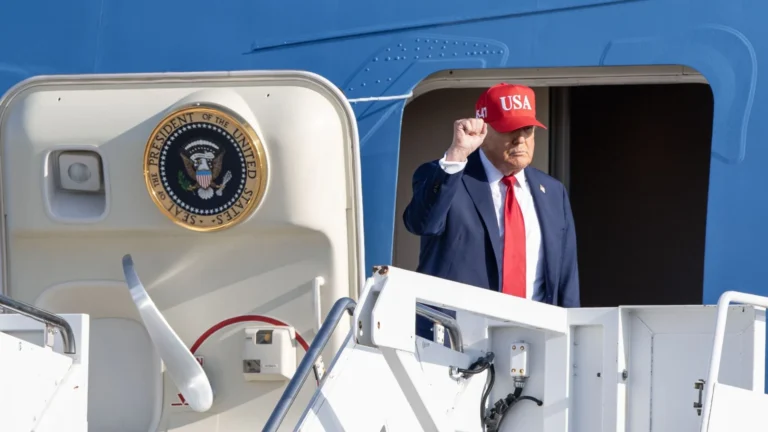By Ralph Abraham and Wyche Coleman | Office of Louisiana Surgeon General
President Donald Trump speaks with members of the press at the White House, Sept. 15, 2025. Harrison Koeppel / Official White House Photo via Flickr / United States Government Work
Our recent government shutdown has brought to the forefront of the national conversation something most people have sensed for a long time: health insurance in the United States is badly broken. This problem is not new, but has been worsening as prices increase at almost an exponential rate while outcomes show the inverse trend. Without massive subsidies, Obamacare will fail in short order. President Donald Trump was onto something when he suggested that money go directly to the people instead of to “BIG, BAD” insurance companies. The president understands the definition of insanity and does not want to repeat the same mistake.
The word “insurance” is really a misnomer when it comes to modern health plans. It’s simply pre-paid healthcare, or more accurately, sick care in its current form.
Just imagine if car insurance were structured like health insurance. Car insurance companies would pay for your gas, oil changes, and repairs. The government would mandate that they cover all these services – whether you liked it or not. It would be expensive, and nobody would question why. Before long, the car insurance companies would find a way to make it harder to buy gas, so you would use less of it, and they could increase their profit margins. Maybe only a few oil change providers would be “in network,” located far away from you, and hard to find. This would be great for the insurance company’s stockholders, but not so good for the car owner.
Eventually, as prices climbed and quality decreased, the politicians who caused the problems in the first place would get involved. They would declare greed the problem and cap profit margins that car insurance companies were allowed to make. The insurers would have to find a workaround to maintain margins. Perhaps they buy up the gas stations, jack up the prices, get lower octane gas, and make you only use certain stations based on which GBM (gasoline benefit manager) you have. If they ran low on cash, the government would bail them out. Car insurance companies are too big to fail.
After a while, with high-priced, scarce gas and oil, and insurance premiums already high, car owners would run out of money for car washes. The government would come in to save the day by mandating that insurance companies pay for that too, with a subsidy or two for anyone who can’t afford a plan. Premium prices would go up again, and the cycle would continue until everyone’s car was dirty, in disrepair, running on empty, with insurance premiums more expensive than the car. This would look great for the insurance company stock as they take a percentage of the total money moved around. The more products and services they are mandated to cover, the better. Simple math: move more money, make more profit. Until one day, the system would break.
As preposterous as the car insurance analogy may sound, that is exactly where we are with healthcare in America. All true market forces connecting the consumer with the product have been removed. The result is predictably higher prices and lower quality. Obamacare mandates compounded the problem, and the system is indeed about to break. Premiums are consuming half or more of many people’s paychecks for bare bones insurance. Forget the “Cadillac plans.”
It’s time to return power to the people and Make Insurance Insurance Again. People should be allowed to have unlimited Health Savings Accounts (HSAs) funded with pretax dollars that roll over forever and bypass the death tax. Employers should be allowed to contribute to their employees’ HSAs if they so choose, just like with 401(k)s. The consumer should then be allowed to buy catastrophic insurance to cover amounts exceeding the HSA limit.
Imagine if a third of the nation had $10,000 or more in an HSA and only purchased catastrophic coverage for amounts over 10k. Insurance would be insurance again, and it would be affordable.
A true free market would exist below the catastrophic coverage amounts, where healthcare consumers could shop and negotiate for better products and services. They would seek out care that keeps them well more of the time, rather than paying only to treat them after they are sick. Prices would be immediately transparent, like a restaurant menu, with no government mandate needed. Otherwise, people would shop elsewhere.
Naysayers will ask: What about Medicaid? For the abled-bodied, it could just be a contribution to their HSA and payment of their catastrophic insurance premium. In Louisiana, we already pay about $10,000 per year per Medicaid enrollee to the MCOs. That should be more than sufficient for an HSA contribution and catastrophic coverage. And Medicaid recipients would now have access to the same doctors and services that private insurance patients enjoy.
A small safety net system would likely still be needed at the state level to care for those who will never be able to care for themselves. However, it could be administered directly by states and would be orders of magnitude simpler than the current Medicaid monstrosities.
As the old Geico commercial used to say: we’re not sure who coined the term “eliminate the middle man,” but we can be fairly certain it wasn’t the middleman. In this case, health insurers are the middlemen that need to be eliminated. Or at least restored to their more proper role of providing actual insurance, rather than low-quality, overpriced prepaid healthcare. President Trump understands this and is on the right track. We should support his efforts to restore healthcare power to the people.
Ralph Abraham is Louisiana Surgeon General and Wyche Coleman is Deputy Surgeon General

